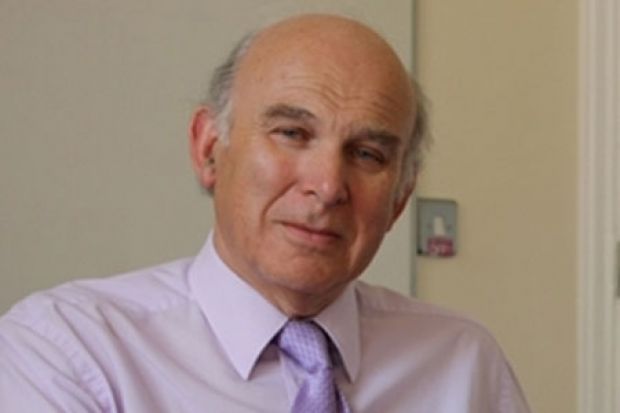Some delegates at the Lib Dem conference in Glasgow described yesterday’s debate on fees as a “sham”, accusing the party’s leadership of trying to bury the controversial topic and prevent full discussion.
However, Vince Cable, the business secretary, said the debate showed the party had moved on from the “traumatic episode” that followed Lib Dem MPs’ 2010 pledge to vote against fees.
During the debate on a broader post-16 education policy motion, Liberal Youth successfully amended a key passage on fees. The party’s youth wing removed a section of the original motion that had said the party’s policies should include “retaining the current system of higher education finance, and committing to a review within the next Parliament”.
Liberal Youth’s amended motion, which was easily passed on a vote, accepted that the current system was “preferable” to that introduced by Labour. But the amended motion also said that the review of the funding system in the next Parliament should lead on to the abolition of fees “if necessary”.
The amendment – which had to be accepted by senior party figures to even be debated at conference – was something of a compromise, allowing the leadership to say the party has ended its trauma over the acceptances of fees, while avoiding a damaging defeat of the entire motion. MPs who rebelled on fees in 2010, along with the wider membership, can maintain their aspiration to phase out fees in the future.
Mr Cable, who is known to have disagreed with the party’s original decision to adopt a policy to phase out fees, ended up backing the Liberal Youth amendment.
“I don’t agree with every line in it, but I would like conference to accept it,” he told delegates.
Mr Cable argued that the party had “moved on from the rancour and the damage around the pledge” – the promise Lib Dem MPs signed with the National Union of Students prior to the 2010 general election to oppose any rise in fees.
“We no longer need to look back,” Mr Cable said. “We’ve got a good policy, which is good for universities, good for social mobility…I think that’s a good record, I think we can campaign on it.”
Mr Cable said he agreed the party should “if necessary change and adapt the policy”, while making clear he could not see a return to a policy of ending fees.
Conference delegates who opposed fees objected to the original proposal to change policy as part of a long and wide-ranging policy motion about diverse aspects of post-16 education.
Wendy Taylor, a Lib Dem councillor in Newcastle, said that the “major and controversial change in Lib Dem policy” should not have been pushed through in such a manner.
“I believe such changes should be properly debated and that we should not accept a coalition compromise as the long-term aim of the Liberal Democrat party,” she told the conference.
Callum Leslie, another delegate who opposed fees, said there had been “no real debate…this is really just a sham”. He called for a return to “member-led policy”.
The original motion, the fruit of an education policy review led by Lib Dem peer Sal Brinton, said: “The current system of higher education funding represents the best deal for students and taxpayers currently available.” It also said a graduate tax had “obvious failings”.
The amended motion removed that wording, instead emphasising access issues and saying that the review in the next Parliament should look at factors such as “widening participation and increasing participation, with a view to reforming the system to address these challenges if possible or if necessary for fees to be eliminated in a feasible and cost-effective way”.
Another amendment, also passed, said the party’s policy should be for fees to remain capped at £9,000, with no increase, pending the review in the next Parliament.




